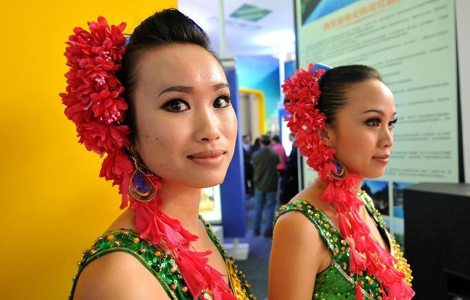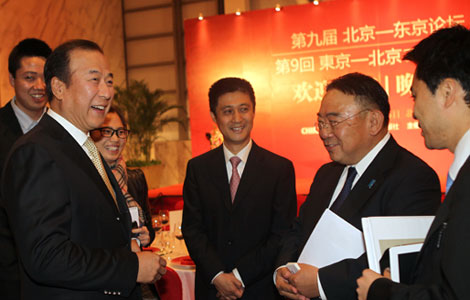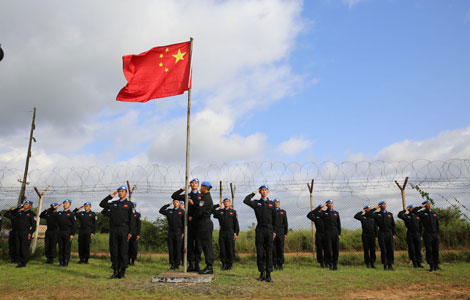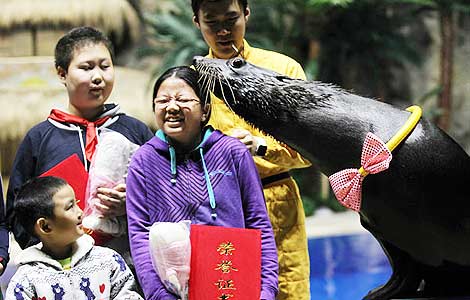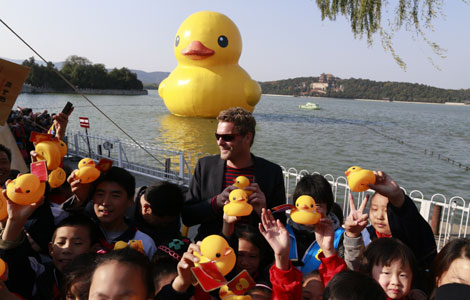

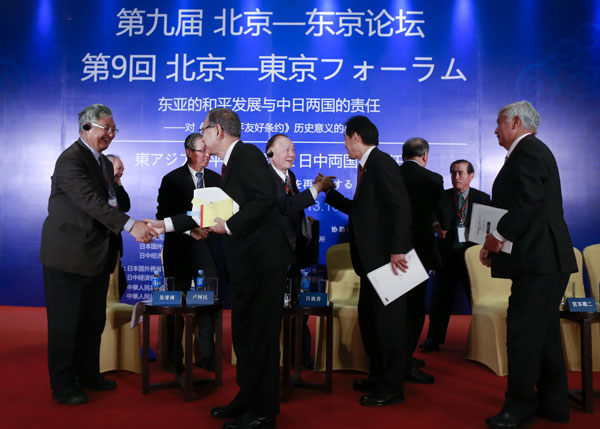 |
|
Representatives of the Ninth Beijing-Tokyo Forum greet each other after Saturday's sessions ended. More than 400 participants attended the forum's opening ceremony on Saturday. Feng Yongbin / China Daily |
Participants' frankness and sincerity help them understand each other better, find common ground and express their ideas
The Beijing-Tokyo Forum in Tokyo in the summer of 2006 was where Shinzo Abe sent a positive signal to China before his first term as Japanese prime minister. Frequent visits to the Yasukuni Shrine by Abe's predecessor, Junichiro Koizumi, had chilled Sino-Japanese relations during Koizumi's tenure.Shortly after taking office, Abe visited China in December 2006, breaking the ice between the two countries. After that, the relationship fared well - until the Japanese government illegally "nationalized" China's Diaoyu Islands in September 2012.
Today, as bilateral relations remain frosty, those with insight into the two countries are pinning high hopes on this year's Beijing-Tokyo Forum in Beijing, a platform for government officials, scholars and diplomats of China and Japan to discuss important issues. The two-day forum began Saturday.
Although the countries' relations have been chilly for more than a year, experts said they still harbor hope that relations can take a turn for the better.
However, a breakthrough is impossible at the ongoing forum, as Abe - again the Japanese prime minister - denies that there is a territorial dispute between China and Japan. And the territorial row is the biggest problem in their bilateral relations.
But the Chinese and Japanese officials who wish to get Sino-Japanese ties back on track still attach a great deal of importance to the forum as a means to find solutions to the deadlock.
Those officials aspire to meet and talk with those from the other side. To find common ground, they dare to express their ideas. Their frankness and sincerity have helped them understand each other better, instead of widening the gap between them.

On Oct 23, Beijing's observation of the China-Japan Peace and Friendship Treaty, which went into effect 35 years ago, inspired the two sides to think hard about where bilateral relations came from. And this should be the solution to the current situation.
When China and Japan restored diplomatic relations and signed the Peace and Friendship Treaty, they agreed to seek common ground while using peaceful solutions to settle their disputes.
When the Japanese government does not honor the consensus on the territorial dispute with China, bilateral relations cannot move forward. Indeed, they will regress.
This represents an apparent reversal of previous Japanese policy on China.
"If nobody is willing to give in, there will be no way out," said Xu Dunxin, member of the Foreign Policy Advisory Group of Ministry of Foreign Affairs and former Chinese ambassador to Japan from 1993-98, at the forum.
"We should listen to the other side and put ourselves in their shoes. In doing so, we will know each other better and attempt to find solutions."
Both sides understand where Sino-Japanese relations are, and they expect that the stalemate will be here for a while.
"Rome was not built in a day," said Wu Ji'nan, researcher with Shanghai Institute of International Studies. "China and Japan need to open their eyes to appreciate the other's merits and advantages."
China, Japan and South Korea have launched a joint study on history. This could serve as an example for the territorial issue, which China and Japan could do joint research on. People from the two countries also recommended that they cooperate on such areas as energy conservation and environmental protection.
They make a good case. We anticipate that the cooperation and discussions like the Beijing-Tokyo Forum will help change Sino-Japanese relations from "ice" to "nice".
